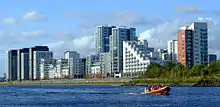Glasgow Harbour
Glasgow Harbour is an urban regeneration scheme at Partick in the West End of the city of Glasgow, Scotland.[1]

Construction
_-_geograph.org.uk_-_1035489.jpg.webp)
After many years of dereliction caused by the decline of shipbuilding and the migration of Glasgow's docks to the Firth of Clyde, since the mid-1980s the banks of the River Clyde at Glasgow have become a focus for property developers. Mirroring the London Docklands scheme, the old docks, and sites of old granaries, wharves and shipyards in Glasgow are being redeveloped into up-market residential apartments, office complexes and leisure facilities.
The earliest developments were the Scottish Exhibition and Conference Centre (SECC) at the former Queen's Dock in 1985,[2] and the Glasgow Garden Festival at the former Prince's Dock in 1988, which demonstrated the potential of the riverside area as a catalyst for urban regeneration. Through the 1990s, riverside apartment buildings began to appear at Lancefield Quay on the North bank and the former General Terminus Quay on the South bank, and the Norman Foster-designed Clyde Auditorium was opened at the SECC in 1997. The former Garden Festival site is now home to the Glasgow Science Centre including Glasgow Tower (the tallest structure in the city and the spiritual successor to the Clydesdale Bank tower which was part of the Garden Festival). There has been further development at this site, with new headquarters for BBC Scotland and Scottish Television at Pacific Quay forming the cornerstone of a new "media village".
Buildings and phases
Phase 1 of the Glasgow Harbour Project, by the Clyde Port Authority at the former Meadowside Granary, Yorkhill Quay and confluence of the River Kelvin in Partick, has consisted of high rise residential accommodation and the construction of a riverside walkway.[3][4][5][6][7][8]
.jpg.webp)
The wider area now includes the Riverside Museum (the city's new Museum of Transport) adjacent to the mouth of the River Kelvin, and there are plans for large-scale commercial developments at the site.[9][10]
In September 2006, the Clyde Arc road bridge opened to traffic, enhancing access to the South Bank at the SECC, while the existing Clydeside Expressway (A814) dual carriageway connects the Harbour area to Glasgow city centre and the Clyde Tunnel. Transport links will also be a key feature of Glasgow Harbour in the future, with a pre-light rail metro system planned, to be called Clyde Fastlink, which will link the area to the city centre areas, with possible interchanges to the Subway. An intermittent ferry service operates between the Riverside Museum and Govan on the south bank.[11]
See also
References
- "Glasgow Harbour". Clyde Waterfront. Retrieved 22 February 2019.
- "QD2 - The Queen's Dock Project". QD2. Archived from the original on 18 January 2010. Retrieved 29 November 2010.
- "gh2o brochure". Dandara Property. 2008. Retrieved 22 February 2019.
- Glasgow Harbour Phase 1 at Emporis
- gh2o at Emporis
- "Glasgow Harbour phase 1". Clyde Waterfront. Retrieved 22 February 2019.
- "Glasgow Harbour phase 2". Clyde Waterfront. Retrieved 22 February 2019.
- "Glasgow Harbour". Gillespies. Retrieved 22 February 2019.
- "Plan to build £100m Glasgow Harbour Lifestyle Outlet". BBC News. 3 July 2018. Retrieved 22 February 2019.
- "Glasgow Harbour 'waterfront destination' back on the cards". Urban Realm. 3 July 2018. Retrieved 22 February 2019.
- "Campaign launched to keep the Govan Ferry going beyond 2016 season". Glasgow Live. 29 July 2016. Retrieved 22 February 2019.